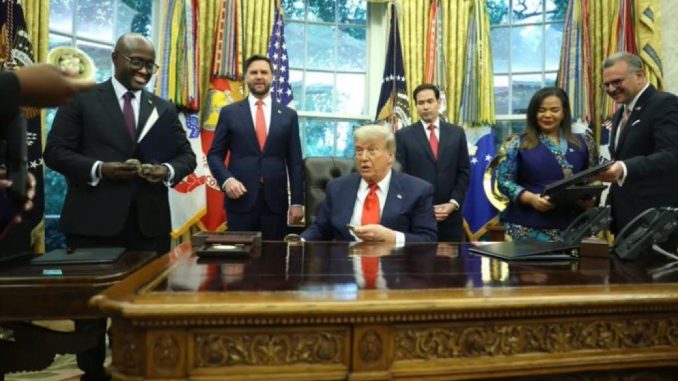
Main argument of the analysis
Ahead of signing the peace agreement between the Democratic Republic of Congo (DRC) and Rwanda (signed on June 27, 2025), the Center for Strategic and International Studies (CSIS) published a commentary made by Mvemba Phezo Dizolele. Dizolele is the Senior Associate with the Africa Programme at the CSIS. See the details of the CSIS argument: https://www.csis.org/analysis/critical-minerals-fragile-peace-drc-rwanda-deal-and-cost-ignoring-root-causes
As per CSIS, the peace agreement between DRC and Rwanda, though initiated by President Felix Tshisekedi, it’s largely driven by Western strategic interest in the DRC’s critical minerals. It fails to confront the underlying political, social, and governance issues in the region and specifically the DRC. Therefore, the deal has potential to become fragile and unsustainable to bring peace.
CSIS argument sets out some critiques and risks associated with an approach that disregards underlying causes of conflict.
- It neglects the root causes
There are two processes, Washington and Doha. The second is likely supplementing (in one way or another the first one). CSIS considers that the Washington agreement leans on mineral while conflicts in the Eastern DRC is a regional power struggles, historical grievances, poor governance, land and citizenship disputes, and competition for resources. Hence, by failing to account for all these factors, stability and peacebuilding remains elusive.
2. More emphasis put on resources
Washington deal is likely putting much emphasis on accessing critical minerals, including Cobalt, coltan, tantalum that overlooks political and social change are more important to achieve peace. There is a likelihood of reinforcing extraction-driven conflict rather than ending it.
- Local communities sidelined
In Washington, negotiations involve more the elite and ruling political parties in DRC and Rwanda while ignoring local communities, civil society, and victims of conflicts. Though complex to involve everyone, the approach may benefit the elite and ruling classes and undermine the peace agreement legitimacy.
- Minerals and not Governance and Justice
The DRC history has been characterized by rampant corruption, institutional weaknesses, the absence of state authority at local levels and lack of rule-of-law that hinder the ability of the Congolese state to fulfill its obligations. Any deal that fails to account for these key challenges is doomed to fail. In addition, the peace deal seems disregard justice mechanisms including the repatriation of refugees, citizenship of “Kinyarwanda-speakers”, reparations for victims, disarmament and reintegration programs, and accountability for war crimes.
- Minerals supply chains traceability
Though pledged have existed in all agreements (including the previous ones), there is a need to establish traceability mechanisms so that minerals are not smuggled to benefit “illegal” traders. More efforts are needed to control mining extraction, mostly in rebels-controlled zones (as per CSIS).
- Geopolitical Priorities and US Commitment
While the peace and mineral deal may counter other potential competitors at the global level including China, the risks associated with geopolitical maneuvers among countries fighting to control DRC’s minerals are also to be considered in the future. In addition, there are other priorities that may divert US attention to other conflicts like Gaza, Ukraine, Iran… and may undermine the US long-term commitment to the regional peacebuilding efforts.
CSIS Takeaways
- The deal agreement needs to anchor economic integration and mineral access within broader peace-building efforts—but it currently elevates resource access above justice, governance, and inclusivity.
- Without institutional reform, accountability measures, and genuine inclusion, peace remains superficial and vulnerable.
- CSIS warns that peace must be the foundation, not a byproduct, of resource-driven cooperation—otherwise, the DRC risks ending with more conflict under the guise of progress.
Misplaced points in CSIS’s argument
- There are oversimplified discourses that are dangerous more than that of former Thabo Mbeki or Prof Patrick Otieno Lumumba. I believe that the list is too long and may include Jean-Luc Mélenchon, Charles Onana, Thierry Mariani and the list is long. Obsession on Thabo Mbeki or Prof Patrick Otieno Lumumba’s stances may be driven by other motives.
- Many analysts like Mvemba Dizolele tend to forget that Rwanda has supported Laurent Desiré Kabila and helped AFDL to topple the former President Mobutu Sese Seko who ruled DRC (former Zaire) for 32 years. For (un)known reasons, there is a tendency within the Congolese political arena (influencing many analysts) to circumvent violence and atrocities committed in DRC before 1998.
- Competition and confrontation among regional countries in the African Great Lakes region, Rwanda-Burundi, Uganda-DRC-Rwanda is slightly touched upon in the CSIS analysis.
- Had CSIS and Mvemba Phezo Dizolele been to document or at least pay attention to the Banyamulenge’s recent experience and atrocities they endured in the last 8 years, they would not give credit to President Tshisekedi’s declaration in London. I wish CSIS would have been fairer when describing such experiences and not simply praise a public declaration.
Eastern Congo Tribune Team

Leave a Reply